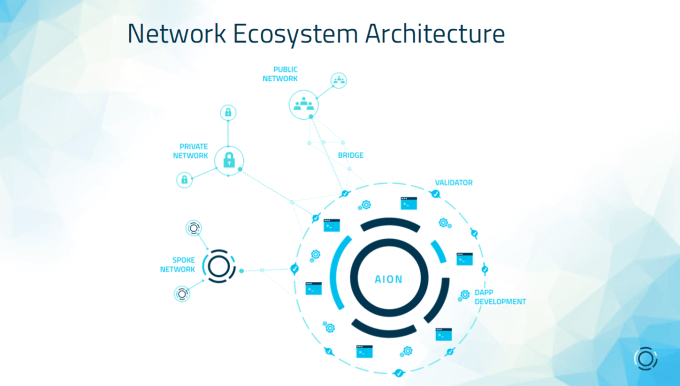If you believe blockchains will proliferate in the coming years, it stands to reason that you will need some sort of mechanism to move information between them, a network of blockchains with bridges and processes for sharing information between entities. That is exactly what The Aion Network is providing with a new blockchain network released today.
The company wants to be the underlying infrastructure for a network of blockchains in a similar way that TCP/IP drove the proliferation of the internet. To that end, the company, which originally began as a for-profit startup called Nuco, has decided to become a not-for-profit organization with the goal of setting up protocols for a set of interconnected blockchains. They now see their role as something akin to the Linux Foundation, helping third party companies build products and creating an ecosystem around their base technology.

Graphic: Aion Networks
“The core design of network we have been building is to connect various networks, and route data and transactions through a public network. We are launching that network today. It allows you to build bridges to other blockchain networks. That public network acts as relayer between blockchains,” Matthew Spoke, CEO and co-founder at Aion Networks told TechCrunch.
While there clearly could be security concerns with a public by-way for blockchain data moving between systems, Spoke says that can be minimized. Instead of transmitting a medical record between a hospital and insurance company, you send a proof that the person had an operation, which the insurance company can check against the coverage rules it has created for that individual and vice versa.
The idea behind this venture is to provide the underlying plumbing to encourage more highly scalable blockchain use cases. Spoke and his team once ran the blockchain practice at Deloitte before starting this venture, and they saw roadblocks to scaling first-hand. “When we were doing enterprise projects, our biggest realization was that the plumbing wasn’t sophisticated enough. The scaling wasn’t meeting specs that enterprise companies would need long term. Because of that, we were not seeing anyone moving beyond proof of concept projects. What we are doing is trying to mature the possible use cases,” he said.
In order to drive adoption, the company is introducing a token or cryptocurrency to be used to move data across the network and build in a level of trust. Spoke believes if the users have skin in the game in the form of tokens, that could create a higher level of trust on the system.
“On the private network there is no [transaction cost] because there is a relative amount of trust. We use a coin on the public system to incentivize bridges. We are incentivizing nodes to play the role of fetching data on one blockchain and bringing it to another network.” He believes if there is a cost associated with that, it will help ensure the integrity of the various blockchains.
“Instead of paying for infrastructure, you are going to pay to be part of a common trusted protocol. It comes down to the mechanism of consensus and being incentivized to do business in an honest way,” Spoke said
This is probably not something that will get adopted widely overnight. Just because they have built it, they still require a level of utilization for it to really take off, and that will require more blockchain projects. “We still need a few years of pure focus on infrastructure to make sure we are getting these layers right. Every time you move data of any kind there are security vulnerabilities and we need to make sure there are good specs and comfort in using it,” he said.
from TechCrunch https://ift.tt/2qXhwsZ
via IFTTT

0 comments: